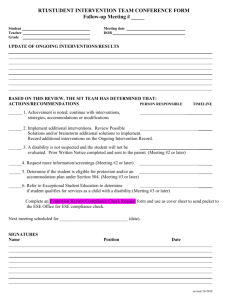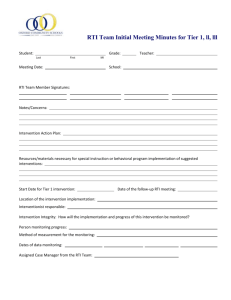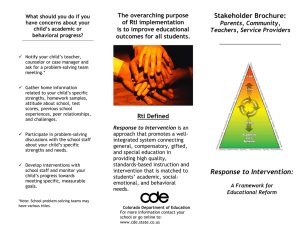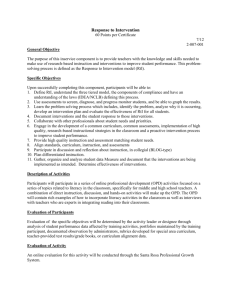M . I ?
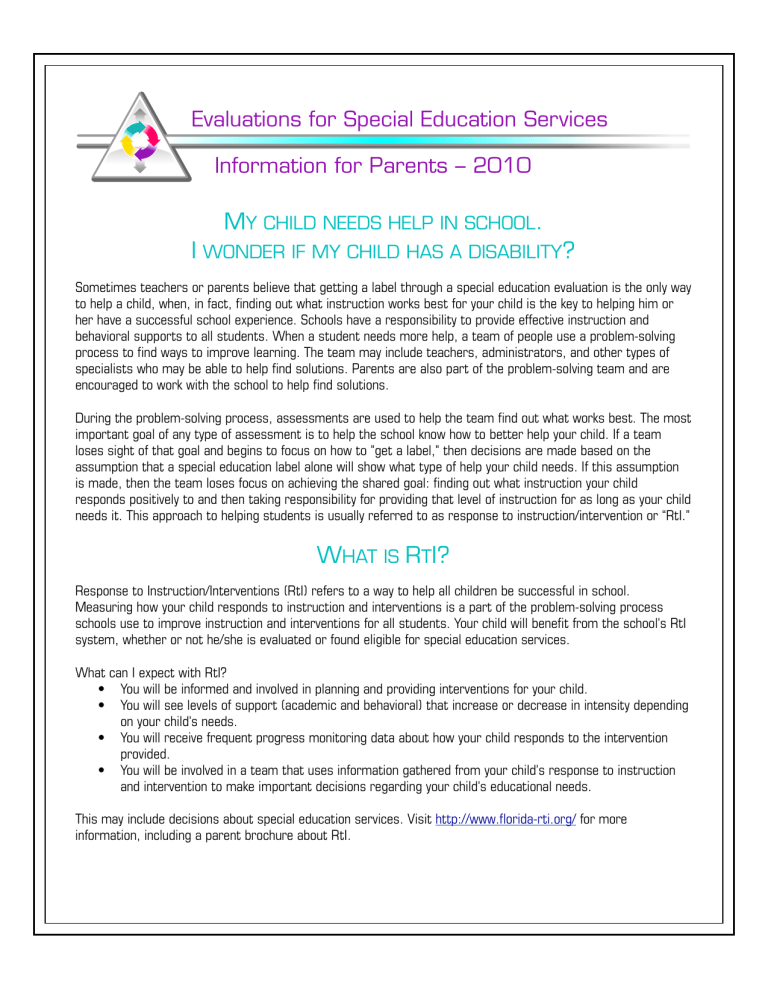
Evaluations for Special Education Services
Information for Parents – 2010
M
Y CHILD NEEDS HELP IN SCHOOL
.
I
WONDER IF MY CHILD HAS A DISABILITY
?
Sometimes teachers or parents believe that getting a label through a special education evaluation is the only way to help a child, when, in fact, finding out what instruction works best for your child is the key to helping him or her have a successful school experience. Schools have a responsibility to provide effective instruction and behavioral supports to all students. When a student needs more help, a team of people use a problem-solving process to find ways to improve learning. The team may include teachers, administrators, and other types of specialists who may be able to help find solutions. Parents are also part of the problem-solving team and are encouraged to work with the school to help find solutions.
During the problem-solving process, assessments are used to help the team find out what works best. The most important goal of any type of assessment is to help the school know how to better help your child. If a team loses sight of that goal and begins to focus on how to "get a label," then decisions are made based on the assumption that a special education label alone will show what type of help your child needs. If this assumption is made, then the team loses focus on achieving the shared goal: finding out what instruction your child responds positively to and then taking responsibility for providing that level of instruction for as long as your child needs it. This approach to helping students is usually referred to as response to instruction/intervention or “RtI.”
W
HAT IS
R
T
I?
Response to Instruction/Interventions (RtI) refers to a way to help all children be successful in school.
Measuring how your child responds to instruction and interventions is a part of the problem-solving process schools use to improve instruction and interventions for all students. Your child will benefit from the school's RtI system, whether or not he/she is evaluated or found eligible for special education services.
What can I expect with RtI?
• You will be informed and involved in planning and providing interventions for your child.
• You will see levels of support (academic and behavioral) that increase or decrease in intensity depending on your child's needs.
• You will receive frequent progress monitoring data about how your child responds to the intervention provided.
• You will be involved in a team that uses information gathered from your child's response to instruction and intervention to make important decisions regarding your child's educational needs.
This may include decisions about special education services. Visit http://www.florida-rti.org/ for more information, including a parent brochure about RtI.
I
HAVE REQUESTED AN EVALUATION FOR MY CHILD
.
N
OW WHAT
?
You have provided a written request for an evaluation that may lead to your child being identified as a student with a disability who needs special education services in school. In response to your request, the school must do one of the following:
1. Obtain your written permission/consent to conduct the evaluation procedures. If the school gets your permission to conduct the evaluation procedures, the school then has 60 school days, with your child in attendance, to complete the evaluation procedures. If this does not occur within the timeline, you may get help by contacting the guidance department at your child’s school, your district exceptional student education office, or the Florida Department of Education at (850) 245-0475.
2. Provide a formal, written refusal to conduct the evaluation procedures with an explanation for the refusal. If the school gives you a formal, written refusal to conduct the evaluation, and you disagree with the reason the school provides, you may get help by contacting the guidance department at your child’s school, your district exceptional student education office, or the Florida Department of Education at
(850) 245-0475.
W
HAT IS THE EVALUATION GOING TO INCLUDE
?
The evaluation procedures will include ongoing assessments of your child's response to the instruction and interventions, interviews, observations, the analysis of all the information about your child, and sometimes individual tests that are given by a specialist such as a school psychologist or a speech/language pathologist.
The details and decisions about what evaluation procedures will be conducted are determined by the team, which includes the parent.
H
OW WILL I KNOW THE RESULTS
?
Once the team decides that it has enough data to determine whether your child is eligible for special education, which is called exceptional student education (ESE) in Florida schools, the evaluation procedures are complete.
Next, you will be invited to a meeting as part of the team to discuss the eligibility decision and next steps for ensuring that your child's educational needs are met. If your child is eligible for ESE services, an individual educational plan (IEP) will be developed. You will be asked to give your consent for services before the IEP can be implemented. If your child is not eligible for ESE services, the team will continue to work with him/her to identify and implement effective instruction and interventions. The team's problem-solving process continues in an ongoing effort to improve and maintain an effective education for your child. If you have any questions, you are encouraged to contact your child's teacher. The relationship between you and your child's teacher, as well as other members of the school team, can be very helpful in the process of finding solutions for meeting your child's educational needs.
Florida
Problem Solving and
Florida Department of Education
Dr. Eric J. Smith, Commissioner
Response to Instruction/Intervention
This brochure is provided by the Florida Department of Education in collaboration with Bureau of Family and Community Outreach, Bureau of
Exceptional Education and Student Services, Pasco County School District, and Florida’s Positive Behavior Support Project.
